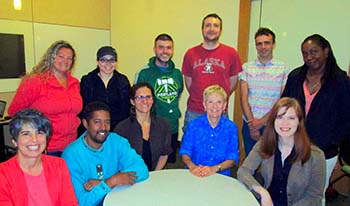A pioneering cohort of Portland, Oregon, area teachers spent the week of 16-20 June 2014 remaking the way local African American history can be taught in public school classrooms. This week-long intensive seminar was led by Portland State University faculty from the College of Liberal Arts and from the Graduate School of Education. Participants did two things. First, they investigated primary sources on Oregon African American history held by Portland State University's Library Special Collections & University Archives. They then examined some of the hands-on methods for teaching middle and high school students with primary source materials, like Document-Based Questions (DBQs). By engaging these two elements together, teachers reworked their pedagogical approaches and their historical content focus. This dual approach was challenging but richly productive. Teachers had to stretch beyond their usual focus on iconic civil rights events (Montgomery, Little Rock) and explore the specific people, places, and incidents of the Oregon context. They also had to make active inquiry by students central and create more open-ended explorations in their assignments. The archive did not yield tidy DBQs all ready to go; nor did the questions each participant brought to the Oregon case track neatly on to the standard civil rights chronology of the mid-twentieth century. Rather, these teacher-scholars had to write the history they planned to teach, as will their students have to write the history they learn. This project brings inquiry-based education to life and places Oregon into a national context as well.
-

Unit Plan: The Desegregation of Portland Public Schools
Sadie Adams and Dia Nelson
The greatest turning point in United States history was when the Brown vs. Board of Education decision outlawed the policy of "separate but equal." It paved the way for equal rights to become a reality across the nation. This unit starts with the national context educating students on segregation before the Brown decision. As students move through the lessons they build background knowledge on the impact of Brown from a national context down to a more local context by focusing on the desegregation in Portland Public Schools in Portland, Oregon. Students will develop reading, writing, and critical thinking skills through a variety of activities. This unit can be taught chronologically or thematically in relation to a Civil Rights unit.
This unit can be placed in a unit/class with the broader theme of national and local equal rights. It is the teacher’s discretion whether students should have explicit instruction on the Civil Rights Act of 1964 and the Voting Rights Act of 1965 prior to teaching this unit.
-

Unit Plan: The Role of the Urban League of Portland in the African American Community
Amber Ferris, Andre Hawkins, and Cari Yelvington
This unit is intended for a high school social studies classroom. It can be utilized in a variety of social studies courses as it touches upon community organizing, Oregon history, and African American history. The lessons focus on the Urban League of Portland's role in "uplifting" the African American community, with particular attention to the issues of equality in housing and education. The unit materials provide some history and basic information about the Urban League of Portland as well. Developing student skill in text and chart analysis is emphasized in this unit. Formative assessments are embedded within the lessons. At the end of the unit, students complete the "National Urban League DBQ" and think critically about the influence of funding on community organizations, drawing conclusions about what happens at the local level versus the national level.
-

Unit Plan: Examining the Struggle for an Equitable Education System in Portland, Oregon
Melinda Gale and Oliver Brown
This unit is designed for five 90 minute periods in US history or African American history.
Using an array of primary sources, as well as select secondary texts, students will investigate the history of segregation, desegregation, and multicultural school reforms in Portland, Oregon. The unit will explore the relationship between local community organizations and Portland Public Schools, having students evaluate the effectiveness of both groups in terms of school reform. In the culminating project students will create a three-minute policy proposal that they present as testimony in a Portland Public Schools Board meeting.
-

Unit Plan: The Role of Community Organizations in the Oregon Civil Rights Movement
Michael Gifford and Lance Erickson
This unit will introduce students to the role of Community Organizations in the Civil Rights Movement in Portland, Oregon. They will be presented with information on the various organizations and issues facing African Americans who lived in Portland during the civil rights movement. At the conclusion of the unit students will be able to discuss the community organizations played in relation to the success of civil rights protests in Portland. They will also have an understanding of how the African American civil rights movement served as a model for modern activism.


